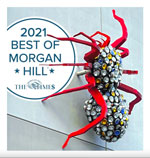Morgan Hill voters expressed their resounding preference for a hotel tax increase, a cannabis business tax program and an appointive city clerk in the Nov. 6 election.
The three local measures are ahead by a landslide, with more than 13,000 total votes cast on each of the questions sponsored by the City of Morgan Hill.
With the passage of Measure H, the city’s transient occupancy or hotel tax will increase from its current rate of 10 percent to 11 percent. More than 11,486 voters, or 79.28 percent, voted in favor of the hotel tax increase Nov. 6, according to the Santa Clara County Registrar of Voters.
Ballots against Measure H totaled 3,001, or about 20.72 percent.
City officials are cautiously optimistic about the current results of Measure H, which won’t become official and certified by the county elections office until Dec. 12. Ten days after the results are certified and if ballot counting concludes with approval of Measure H, the city can then start collecting the bumped-up 11-percent total tax from hotels in the city limits, according to Morgan Hill Economic Development Director Edith Ramirez.
The hotel tax is paid by patrons of local lodging facilities. The increase to 11 percent is expected to bring the city an additional $270,000 in annual revenue for the general fund, which pays for basic services like public safety and streets maintenance.
The transient occupancy tax increase is just one new revenue source expected to be generated by hotel visits that city officials are excited about. The council has also approved a Tourism Based Improvement District, in which hotel owners will charge guests an additional 1.5 percent for room stays, Ramirez explained. That revenue will go to a separate fund used solely for the hotels to pay for marketing and promotion of their facilities and Morgan Hill as a tourism destination.
The council is expected to consider approving a resolution of intent to enact the TBID at its Nov. 28 meeting. After that will begin a 45-day public hearing and review process, Ramirez said. The program must also be approved by a majority of hotel owners in the city limits, which Ramirez thinks is likely.
The TBID will generate about $410,000 per year for the promotion and marketing of Morgan Hill for tourism purposes.
The combination of the likely hotel tax increase and TBID implementation represents a spirit of cooperation, Ramirez said.
“This is a way the city has managed to move forward separate goals,” Ramirez said. “The (TOT) will bring additional revenue for city…and the TBID is supposed to generate marketing and promotion of the area, which also ultimately generates more revenue for the city. The silver lining is that there has been a lot of work between the hotels and city to find a collaborative path where you are advancing both goals.”
Cannabis tax nets nearly 80 percent approval
Morgan Hill voters in the Nov. 6 election also demonstrated their clear preference for a cannabis business tax in the city, should a future city council decide to allow such business here.
About 11,295 voters cast ballots in favor of Measure I, which would establish a business tax for the commercial cannabis industry. Voting against the cannabis tax measure were 2,957 voters, or about 20.75 percent of the votes cast in the Nov. 6 election, according to the registrar’s unofficial results.
The ballot measure language states that annual cannabis tax rates in Morgan Hill would be no more than $15 per canopy square foot for licensed cultivation operations and up to 10 percent of gross receipts for all other cannabis business in the city limits. The tax would generate between $340,000 and $750,000 annually for the city’s general fund.
Mayor Steve Tate—who will retire at the end of this year, making way for mayor-elect Rich Constantine—said it will be up to a future city council to decide if Morgan Hill should allow commercial cannabis business.
“Our intent was to put a tax on the ballot to see if the population was willing to tax marijuana, and they overwhelmingly said yes, they were,” Tate said. “Now the council will have to see if they want to implement anything that gets taxed.”
Current council members have expressed a range of tolerance for potential marijuana business in Morgan Hill in previous public discussions. Tate has been one of the most vocal local officials against the permitting of marijuana business in Morgan Hill, but other council members have expressed more openness to the industry.
Council can appoint next city clerk
Morgan Hill voters also showed their support for an appointive city clerk, as Measure J has so far gained well over 60 percent support in the Nov. 6 ballot counting.
As of Nov. 13, 8,359 or 62.04 percent of voters voted to aprove Measure J. Voting no were 5,115 electors.
The local city clerk position, currently occupied by Irma Torrez, has been elected since Morgan Hill’s founding. With the approval of Measure J, the position will be appointed by the city council.
Torrez is currently about halfway through her sixth four-year term as city clerk. She has served in the position for 22 years. Torrez told the Times she plans to complete her current term.
At the end of Torrez’ current term in 2020, the elected city council will have the option to appoint her replacement under the terms of Measure J.
Tate said of the unofficial results of all three city-sponsored local measures, “We appreciate everybody voting the way we asked them to. It was an affirmation that we’re kind of on the right track.”







